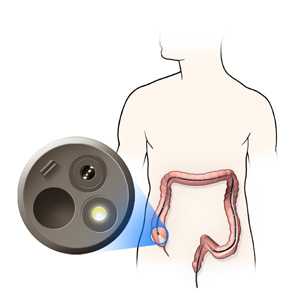Colonoscopy
 What is a colonoscopy?
What is a colonoscopy?
A colonoscopy is a thin camera (flexible plastic tube) that is used to examine the inside lining of your large bowel and the end of your small bowel. It is used to diagnose several conditions including cancers, diverticular disease, polyps and colitis.
What happens during the procedure?
During the procedure, the anaesthetist will give you medicine through the vein to allow you to get into a sleepy state. You may experience mild pressure or bloating during the procedure but will not remember it. It rarely causes much pain. The procedure usually lasts for 15-20 minutes and the specialist will tell you the results immediately afterwards. Biopsies (a specimen) can often be taken during the examination to obtain more information.
Which common conditions can be diagnosed during the colonoscopy?
- Cancers
- Polyps
- Diverticular disease
- Haemorrhoids
- Colitis (inflammation); Crohn’s disease and Ulcerative Colitis
What are polyps?
These are abnormal growths on the inner lining of your bowel, which can vary in size from very small (millimetres) to several centimetres. Most polyps are benign but a proportion can be cancerous – all polyps are removed during the colonoscopy and sent off to the laboratory for analysis. You will feel no pain or sensation during the process of removing these polyps.
What preparation is required?
Please refer to the following link: bowel preparation.
What happens after the procedure?
The sedation will start wearing off approximately half an hour after the procedure is complete. It takes 2-3 hours after completion to feel completely alert. However, you are NOT permitted to drive and somebody will need to pick you up and ensure that you are not alone for the remaining of the day.
What are the possible complications of a colonoscopy?
The Specialist, prior to the procedure, will discuss these with you in detail.


 What is a colonoscopy?
What is a colonoscopy?